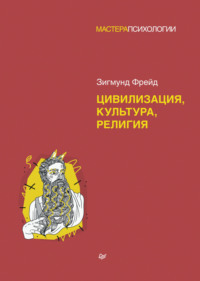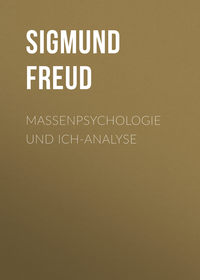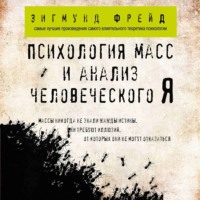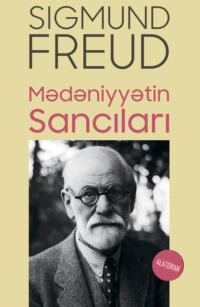 полная версия
полная версияDelusion and Dream : an Interpretation in the Light of Psychoanalysis of Gradiva
Norbert Hanold became conscious in his dream that it was actually the most utter madness, and he cast about to free himself from it. He succeeded in this by the aid of an invisible bird, who seemingly uttered a short, merry call, and carried the lizard away in its beak; afterwards everything disappeared.
On awakening he remembered that in the night a voice had said that in the spring one gave roses, or rather this was recalled to him through his eyes, for his gaze, passing down from the window, came upon a bright bush of red flowers. They were of the same kind as those which the young lady had worn in her bosom, and when he went down he involuntarily plucked a couple and smelled of them. In fact, there must be something peculiar about Sorrento roses, for their fragrance seemed to him not only wonderful, but quite new and unfamiliar, and at the same time he felt that they had a somewhat liberating effect upon his mind. At least they freed him from yesterday’s timidity before the gatekeepers, for he went, according to directions, in through the “ingresso” to Pompeii, paid double the amount of admission fee, and quickly struck out upon streets which took him from the vicinity of other visitors. The little sketch-book from the house of Meleager he carried along with the green brooch and the red roses, but the fragrance of the latter had made him forget to eat breakfast, and his thoughts were not in the present, but were directed exclusively to the noon hour, which was still far off; he had to pass the remaining interval, and for this purpose he entered now one house, now another, as a result of which activity the idea probably occurred to him that Gradiva had also walked there often before or even now sought these places out sometimes – his supposition that she was able to do it only at noon was tottering. Perhaps she was at liberty to do it in other hours of the day, possibly even at night in the moonlight. The roses strengthened this supposition strangely for him, when he inhaled, as he held them to his nose; and his deliberations, complaisant, and open to conviction, made advances to this new idea, for he could bear witness that he did not cling to preconceived opinions at all, but rather gave free rein to every reasonable objection, and such there was here without any doubt, not only logically, but desirably valid. Only the question arose whether, upon meeting her then, the eyes of others could see her as a corporeal being, or whether only his possessed the ability to do that. The former was not to be denied, claimed even probability for itself, transformed the desirable thing into quite the opposite, and transported him into a low-spirited, restless mood. The thought that others might also speak to her and sit down near her to carry on a conversation with her made him indignant; to that he alone possessed a claim, or at any rate a privilege, for he had discovered Gradiva, of whom no one had formerly known, had observed her daily, taken her into his life, to a degree, imparted to her his life-strength, and it seemed to him as if he had thereby again lent to her life that she would not have possessed without him. Therefore he felt that there devolved upon him a right, to which he alone might make a claim, and which he might refuse to share with anyone else.
The advancing day was hotter than the two preceding; the sun seemed to have set her mind to-day on a quite extraordinary feat, and made it regrettable, not only in an archæological, but also in a practical connection, that the water system of Pompeii had lain burst and dried up for two thousand years. Street fountains here and there commemorated it and likewise gave evidence of their informal use by thirsty passers-by, who had, in order to bend forward to the jet, leaned a hand on the marble railing and gradually dug out a sort of trough in the place, in the same way that dropping wears away stone; Norbert observed this at a corner of the Strada della Fortuna, and from that the idea occurred to him that the hand of Zoë-Gradiva, too, might formerly have rested here in that way, and involuntarily he laid his hand into the little hollow, yet he immediately rejected the idea, and felt annoyance at himself that he could have done it; the thought did not harmonize at all with the nature and bearing of the young Pompeiian girl of a refined family; there was something profane in the idea that she could have bent over so and placed her lips on the very pipe from which the plebeians drank with coarse mouths. In a noble sense, he had never seen anything more seemly than her actions and movements; he was frightened by the idea that she might be able to see by looking at him that he had had the incredibly unreasonable thought, for her eyes possessed something penetrating; a couple of times, when he had been with her, the feeling had seized him that she looked as if she were seeking for access to his inmost thoughts and were looking about them as if with a bright steel probe. He was obliged, therefore, to take great care that she might come upon nothing foolish in his mental processes.
It was now an hour until noon and in order to pass it, he went diagonally across the street into the Casa del Fauno, the most extensive and magnificent of all the excavated houses. Like no other, it possessed a double inner court and showed, in the larger one, on the middle of the ground, the empty base on which had stood the famous statue of the dancing faun after which the house had been named. Yet there stirred in Norbert Hanold not the least regret that this work of art, valued highly by science, was no longer here, but, together with the mosaic picture of the Battle of Alexander, had been transferred to the Museo Nazionale in Naples; he possessed no further intention nor desire than to let time move along, and he wandered about aimlessly in this place through the large building. Behind the peristyle opened a wider room, surrounded by numerous pillars, planned either as another repetition of the peristyle or as an ornamental garden; so it seemed at present for, like the dining-room of the Casa di Meleagro, it was completely covered with poppy-blooms. Absent-mindedly the visitor passed through the silent dereliction.
Then, however, he stopped and rested on one foot; but he found himself not alone here; at some distance his glance fell upon two figures, who first gave the impression of only one, because they stood as closely as possible to each other. They did not see him, for they were concerned only with themselves, and, in that corner, because of the pillars, might have believed themselves undiscoverable by any other eyes. Mutually embracing each other, they held their lips also pressed together, and the unsuspected spectator recognized, to his amazement, that they were the young man and woman who had last evening seemed to him the first congenial people encountered on this trip. For brother and sister, their present position, the embrace and the kiss, it seemed to him had lasted too long. So it was surely another pair of lovers, probably a young bridal couple, an Augustus and Gretchen, too.
Strange to relate, however, the two latter did not, at the moment, enter Norbert’s mind, and the incident seemed to him not at all ridiculous nor repulsive, rather it heightened his pleasure in them. What they were doing seemed to him as natural as it did comprehensible; his eyes clung to the living picture, more widely open than they ever had been to any of the most admired works of art, and he would have gladly devoted himself for a longer time to his observation. Yet it seemed to him that he had wrongfully penetrated into a consecrated place and was on the point of disturbing a secret act of devotion; the idea of being noticed there struck terror to his heart, and he quickly turned, went back some distance noiselessly on tiptoe and, when he had passed beyond hearing distance, ran out with bated breath and beating heart to the Vicolo del Fauno.
When he arrived before the house of Meleager, he did not know whether it was already noon, and did not happen to question his watch about it, but remained before the door, standing looking down with indecision for some time at the “Ave” in the entrance. A fear prevented him from stepping in, and strangely, he was equally afraid of not meeting Gradiva within, and of finding her there; for, during the last few moments, he had felt quite sure that, in the first case, she would be staying somewhere else with some younger man, and, in the second case, the latter would be in company with her on the steps between the pillars. Toward the man, however, he felt a hate far stronger than against all the assembled common house-flies; until to-day he had not considered it possible that he could be capable of such violent inner excitement. The duel, which he had always considered stupid nonsense, suddenly appeared to him in a different light; here it became a natural right which the man injured in his own rights, or mortally insulted, made use of as the only available means to secure satisfaction or to part with an existence which had become purposeless. So he suddenly stepped forward to enter; he would challenge the bold man and would – this rushed upon him almost more powerfully – express unreservedly to her that he had considered her something better, more noble, and incapable of such vulgarity.
He was so filled to the brim with this rebellious idea that he uttered it, even though there was not apparently the least occasion for it, for, when he had covered the distance to the dining-room with stormy haste, he demanded violently, “Are you alone?” although appearances allowed of no doubt that Gradiva was sitting there on the steps, just as much alone as on the two previous days.
She looked at him amazed and replied, “Who should still be here after noon? Then the people are all hungry and sit down to meals. Nature has arranged that very happily for me.”
His surging excitement could not, however, be allayed so quickly, and without his knowledge or desire, he let slip, with the conviction of certainty, the conjecture which had come over him outside; for he added, to be sure somewhat foolishly, that he could really not think otherwise.
Her bright eyes remained fixed upon his face until he had finished. Then she made a motion with one finger against her brow and said, “You – ” After that, however, she continued, “It seems to me quite enough that I do not remain away from here, even though I must expect that you are coming here at this time; but the place pleases me, and I see that you have brought me my sketch-book that I forgot here yesterday. I thank you for your vigilance. Won’t you give it to me?” The last question was well founded, for he showed no disposition to do so, but remained motionless. It began to dawn upon him that he had imagined and worked out a monstrous piece of nonsense, and had also given expression to it; in order to compensate, as far as possible, he now stepped forward hastily, handed Gradiva the book, and at the same time sat down near her on the step, mechanically. Casting a glance at his hand, she said, “You seem to be a lover of roses.”
At these words he suddenly became conscious of what had caused him to pluck and bring them and he responded, “Yes, – of course, not for myself, have I – you spoke yesterday – and last night, too, some one said it to me – people give them in spring.”
She pondered briefly before she answered, “Ah, so – yes, I remember. To others, I meant, one does not give asphodel, but roses. That is polite of you; it seems your opinion of me is improved.”
Her hand stretched out to receive the red flowers, and, handing them to her, he rejoined, “I believed at first that you could be here only during the noon hour, but it has become probable to me that you also, at some other time – that makes me very happy – ”
“Why does it make you happy?”
Her face expressed lack of comprehension – only about her lips there passed a slight, hardly noticeable quiver. Confused, he offered, “It is beautiful to be alive; it has never seemed so much so to me before – I wished to ask you?” He searched in his breast pocket and added, as he drew out the object, “Has this brooch ever belonged to you?”
She leaned forward a little toward it, but shook her head. “No, I can’t remember. Chronologically it would, of course, not be impossible, for it probably did not exist until this year. Did you find it in the sun perhaps? The beautiful green patina surely seems familiar to me, as if I had already seen it.”
Involuntarily he repeated, “In the sun? – why in the sun?”
“‘Sole’ it is called here. It brings to light many things of that sort. Was the brooch said to have belonged to a young girl who is said to have perished, I believe, in the vicinity of the Forum, with a companion?”
“Yes, who held his arm about her – ”
“Ah, so – ”
The two little words apparently lay upon Gradiva’s tongue as a favourite interjection, and she stopped after it for a moment before she added, “Did you think that on that account I might have worn it? and would that have made you a little – how did you say it before? – unhappy?”
It was apparent that he felt extraordinarily relieved and it was audible in his answer, “I am very happy about it – for the idea that the brooch belonged to you made me – dizzy.”
“You seem to have a tendency for that. Did you perhaps forget to eat breakfast this morning? That easily aggravates such attacks; I do not suffer from them, but I make provision, as it suits me best to be here at noon. If I can help you out of your unfortunate condition a little by sharing my lunch with you – ”
She drew out of her pocket a piece of white bread wrapped in tissue paper, broke it, put half into his hand, and began to devour the other with apparent appetite. Thereby her exceptionally dainty and perfect teeth not only gleamed between her lips with pearly glitter, but in biting the crust caused also a crunching sound so that they gave the impression of being not unreal phantoms, but of actual, substantial reality. Besides, with her conjecture about the postponed breakfast, she had, to be sure, hit upon the right thing; mechanically he, too, ate, and felt from it a decidedly favourable effect on the clearing of his thoughts. So, for a little while, the couple did not speak further, but devoted themselves silently to the same practical occupation until Gradiva said, “It seems to me as if we had already eaten our bread thus together once two thousand years ago. Can’t you remember it?”
He could not, but it seemed strange to him now that she spoke of so infinitely remote a past, for the strengthening of his mind by the nourishment had brought with it a change in his brain. The idea that she had been going around here in Pompeii such a long time ago would no longer harmonize with sound reason; everything about her seemed of the present, as if it could be scarcely more than twenty years old. The form and colour of her face, the especially charming, brown, wavy hair, and the flawless teeth; also, the idea that the bright dress, marred by no shadow of a spot, had lain countless years in the pumice ashes contained something in the highest degree inconsistent. Norbert was seized by a feeling of doubt whether he were really sitting here awake or were not more probably dreaming in his study, where, in contemplation of the likeness of Gradiva, he had been overcome by sleep, and had dreamed that he had gone to Pompeii, had met her as a person still living, and was dreaming further that he was still sitting so at her side in the Casa di Meleagro. For that she was really still alive or had been living again could only have happened in a dream – the laws of nature raised an objection to it —
To be sure, it was strange that she had just said that she had once shared her bread with him in that way two thousand years ago. Of that he knew nothing, and even in the dream could find nothing about it.
Her left hand lay with the slender fingers calmly on her knees. They bore the key to the solution of an inscrutable riddle —
Even in the dining-room of the Casa di Meleagro the boldness of the common house-fly was not deterred; on the yellow pillar opposite him he saw one running up and down in a worthless way in greedy quest; now it whizzed right past his nose.
He, however, had to make some answer to her question, if he did not remember the bread that he had formerly consumed with her, and he said suddenly, “Were the flies then as devilish as now, so that they tormented you to death?”
She glanced at him with utterly incomprehending astonishment and repeated, “The flies? Have you flies on your mind now?”
Then suddenly the black monster sat upon her hand, which did not reveal by the slightest quiver that she noticed it. Thereupon, however, there united in the young archæologist two powerful impulses to execute the same deed. His hand went up suddenly and clapped with no gentle stroke on the fly and the hand of his neighbour.
With this blow there came to him, for the first time, sense, consternation and also a joyous fear. He had delivered the stroke not through empty air, but on an undoubtedly real, living and warm, human hand which, for a moment apparently absolutely startled, remained motionless under his. Yet then she drew it away with a jerk, and the mouth above it said, “You are surely apparently crazy, Norbert Hanold.”
The name, which he had disclosed to no one in Pompeii, passed so easily, assuredly and clearly from her lips that its owner jumped up from the steps, even more terrified. At the same time there sounded in the colonnade footsteps of people who had come near unobserved; before his confused eyes appeared the faces of the congenial pair of lovers from the Casa del Fauno, and the young lady cried, with a tone of greatest surprise, “Zoë! You here, too? and also on your honeymoon? You have not written me a word about it, you know.”
Norbert was again outside before Meleager’s house in the Strada di Mercurio. How he had come there was not clear to him, it must have happened instinctively, and, caused by a lightning-like illumination in him, was the only thing that he could do not to present a thoroughly ridiculous figure to the young couple, even more to the girl greeted so pleasantly by them, who had just addressed him by his Christian and family names, and most of all to himself. For even if he grasped nothing, one fact was indisputable. Gradiva, with a warm, human hand, not unsubstantial, but possessing corporeal reality, had expressed an indubitable truth; his mind had, in the last two days, been in a condition of absolute madness; and not at all in a silly dream, but rather with the use of eyes and ears such as is given by nature to man for reasonable service. Like everything else, how such a thing had happened escaped his understanding, and only darkly did he feel that there must have also been in the game a sixth sense which, obtaining the upper hand in some way, had transformed something perhaps precious to the opposite. In order to get at least a little more light on the matter by an attempt at meditation, a remote place in solitary silence was absolutely required; at first, however, he was impelled to withdraw as quickly as possible from the sphere of eyes, ears and other senses, which use their natural functions as suits their own purpose.
As for the owner of that warm hand, she had, at any rate, from her first expression, been surprised by the unforeseen and unexpected visit at noon in the Casa di Meleagro in a not entirely pleasant manner. Yet, of this, in the next instant, there was no trace to be seen in her bright countenance; she stood up quickly, stepped toward the young lady and said, extending her hand, “It certainly is pleasant, Gisa; chance sometimes has a clever idea too. So this is your husband of two weeks? I am glad to see him, and, from the appearance of both of you, I apparently need not change my congratulations for condolence. Couples to whom that would be applied are at this time usually sitting at lunch in Pompeii; you are probably staying near the ‘ingresso’; I shall look you up there this afternoon. No, I have not written you anything; you won’t be offended at me for that, for you see my hand, unlike yours, is not adorned by a ring. The atmosphere here has an extremely powerful effect on the imagination, which I can see in you; it is better, of course, than if it made one too matter-of-fact. The young man who just went out is labouring also under a remarkable delusion; it seems to me that he believes a fly is buzzing in his head; well, everyone has, of course, some kind of bee in his bonnet. As is my duty, I have some knowledge of entomology and can, therefore, be of a little service in such cases. My father and I live in the ‘Sole’; he, too, had a sudden and pleasing idea of bringing me here with him if I would be responsible for my own entertainment, and make no demands upon him. I said to myself that I should certainly dig up something interesting alone here. Of course I had not reckoned at all on the find which I made – I mean the good fortune of meeting you, Gisa; but I am talking away the time, as is usually the case with an old friend – My father comes in out of the sun at two o’clock to eat at the ‘Sole’; so I have to keep company there with his appetite and, therefore, I am sorry to say, must for the moment forego your society. You will, of course, be able to view the Casa di Meleagro without me; that I think likely, though I can’t understand it, of course. Favorisca, signor! Arrivederci, Gisetta! That much Italian I have already learned, and one really does not need more. Whatever else is necessary one can invent – please, no, senza complimenti!”
This last entreaty of the speaker concerned a polite movement by which the young husband had seemed to wish to escort her. She had expressed herself most vividly, naturally and in a manner quite fitting to the circumstances of the unexpected meeting of a close friend, yet with extraordinary celerity, which testified to the urgency of the declaration that she could not at present remain longer. So not more than a few minutes had passed since the hasty exit of Norbert Hanold, when she also stepped from the house of Meleager into the Strada di Mercurio. This lay, because of the hour, enlivened only here and there by a cringing lizard, and for a few moments the girl, hesitating, apparently gave herself over to a brief meditation. Then she quickly struck out in the shortest way to the gate of Hercules, at the intersection of the Vicolo di Mercurio and the Strada di Sallustio, crossed the stepping-stones with the gracefully buoyant Gradiva-walk, and thus arrived very quickly at the two ruins of the side wall near the Porta Ercolanese. Behind this there stretched at some length the Street of Tombs, yet not dazzlingly white, nor overhung with glittering sunbeams, as twenty-four hours ago, when the young archæologist had thus gazed down over it with searching eyes. To-day the sun seemed to be overcome by a feeling that she had done a little too much good in the morning; she held a grey veil drawn before her, the condensation of which was visibly being increased, and, as a result, the cypresses, which grew here and there in the Strada di Sepolcri, rose unusually sharp and black against the heavens. It was a picture different from that of yesterday; the brilliance which mysteriously glittered over everything was lacking; the street also assumed a certain gloomy distinctness, and had at present a dead aspect which honoured its name. This impression was not diminished by an isolated movement at its end, but was rather heightened by it; there, in the vicinity of the Villa of Diomede, a phantom seemed to be looking for its grave, and disappeared under one of the monuments.
It was not the shortest way from the house of Meleager to the “Albergo del Sole,” rather the exactly opposite direction, but Zoë-Gradiva must have also decided that time was not yet importuning so violently to lunch, for after a quite brief stop at the Hercules Gate, she walked farther along the lava-blocks of the Street of Tombs, every time raising the sole of her lingering foot almost perpendicularly.
The Villa of Diomede – named thus, for people of the present, after a monument which a certain freed-man, Marcus Arrius Diomedes, formerly promoted to the directorship of this city-section, had erected near by for his lady, Arria, as well as for himself and his relatives – was a very extensive building and concealed within itself a part of the history of the destruction of Pompeii not invented by imagination. A confusion of extensive ruins formed the upper part; below lay an unusually large sunken garden surrounded by a well-preserved portico of pillars with scanty remnants of a fountain and a small temple in the middle; and farther along two stairways led down to a circular cellar-vault, lighted only dimly by gloomy twilight. The ashes of Vesuvius had penetrated into this also, and the skeletons of eighteen women and children had been found here; seeking protection they had fled, with some hastily gathered provisions, into the half-subterranean space, and the deceptive refuge had become the tomb of all. In another place the supposed, nameless master of the house lay, also stretched out choked on the ground; he had wished to escape through the locked garden-door, for he held the key to it in his fingers. Beside him cowered another skeleton, probably that of a servant, who was carrying a considerable number of gold and silver coins. The bodies of the unfortunates had been preserved by the hardened ashes; in the museum at Naples there is under glass, the exact impression of the neck, shoulders and beautiful bosom of a young girl clad in a fine, gauzy garment.









